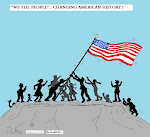American support not as strong as
Israel wears on its lapel.
By
December 5, 2012
If one could
percolate all of the conflict in the Middle East, the 9-11 attack on US soil
and civil liberties Americans have lost as a result of the fabricated
#WarOnTerror , one could see at the bottom of the strainer, the remainder source
of the world’s problems, including our own, and that is: our involvement as
main arbitrator of peace between Israel and the Palestinians, the blind support
US gives Israel, and the footprint we have in every repressive regime or
kingdom in that part of the world. The facts
notwithstanding, the recent vote at the United Nations favoring the Palestinians
cause, truly places the US on the world stage, however, the king now stands
naked before the eyes of the world – alone and isolated. So what will happen next
to US and Israel?
On November
29, 2012 State Dept Sec. Hillary Clinton officially commented that the UN Vote
was “unfortunate and counter-productive.” But just a day after, at a dinner in
her honor, she was more sincere; she lambasted Israel for having been
“insensitive” to the Palestinian needs – diplomatic language for being
“treacherous.” In the meantime, during
the UN vote, it is said that at the Knesset, the Likud and nationalist leaders
were somewhat put-off, and were even sarcastic at the UN vote they felt was
meaningless.
Thus, brushing
off their shoulders for what had just happened, Prime Minister Benjamin
Netanyahu along with his closest political right wing supporter, Foreign Minister
Abigdor Lieberman, announced Israel would began building new settlements outside
the E1 area, i.e., building east of Jerusalem, in the area within West Bank
proper. Additionally, the Israeli
government immediately issued a public briefing stating it would also be
confiscating Palestinian funds from several sources. These would be some of the several responses
the Israeli government would do – and more.
Thus, one can just imagine what Israel was contemplating, after having
come out unscathed from a barrage of rickety-rockets from Hamas and with full
official support of the European Union and the United States of America,
Netanyahu’s regime must have felt untouchable. Moreover, their “Iron dome” was
almost impenetrable and this perhaps gave the Israeli government a sense of
invincibility.
However, to
the surprise of Israel, most of the European nations voted in support of the de facto state of Palestine, with the
exception of the Czech Republic. In
fact, they even expected Germany to vote no, but instead, Germany abstained.
Nonetheless, despite the overwhelming rebuke, Israel remains unrepentant and
unapologetic.
The United
States on the other hand, officially remains supportive of Israel’s approach to
negotiated peace talks between the two parties.
However, the Obama Administration realizes that both Israel and the US
are now lumped together as a team that is isolated from the rest of the diplomatic
world. But, unlike Israel, the US is
realistic and recognizes the UN vote was a diplomatic disaster.
For Israel, its
modus operandi will remain status quo ante (same as before). But, is it wise for Israel to continue kicking
the can down the road – as Likud party leaders refer to, of their policy of
peace talks with the Palestinians? Can
their overconfident attitude and robust US endless supply of weaponry guarantee
Israel’s peace and security? The answer is NO – as a great number of nations
were so deliberate in their UN vote. Moreover, the dynamics in the area have
changed and they do not favor Israel. Also,
keep in mind that Netanyahu’s hope for US president, Mitt Romney, lost – and Republicans,
the staunch religious political support for Israel, also lost. And of greatest concern to Israel, is that 70%
of American Jews voted for President Obama and not for the Republican candidate
who made Israel’s support the hallmark of his campaign.
So, what
these facts in American politics say is that support for Israel may not be as prominent
and solid as Israel wears on its lapel. In
fact, the American people may well be fickle, but, they can also be just as
pragmatic. Thus, support for Israel can officially change if Israel were to
remain obstinate. Already, criticism of
Israel is coming out of previously whispering conversations – the taboo no
longer a social constraint.
Therefore, the
most obvious and reasonable course of
action for Israel is to stop the intransigency and undergo UN supervision of
peace talks, with the end goal, of adhering to existing UN resolutions which call for Israel to retreat back to 1967
borders. Additionally, the US must step
back and allow the UN to take the lead in peace negotiations, but it should
also not stand in the way in any UN Security Council resolution favoring a
Palestinian state, or condemning Israel if the case may arise. For as long as
Israel understands that the US can or will use its veto power at the Security
Council, Israel will have no incentive to negotiate in good faith with the
Palestinians or adhere to international law requirements.
Already,
several European nations such as France and England, are recalling their ambassadors
in Israel for consultations. In diplomatic gesture, it is a slap in the face
for Israel, but also for its benefactor, the US. Many other nations may also follow suit. In sum, what we do will determine who we are
and what we stand for. Thus, in the face
of international scorn we must not stand with the status quo.








No comments:
Post a Comment